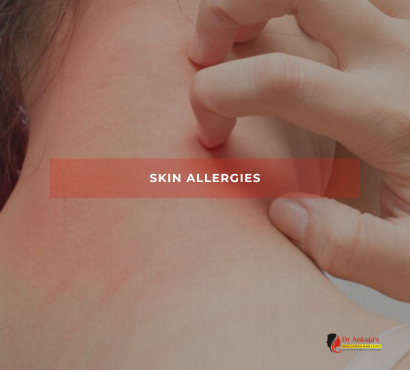Skin allergies are a widespread issue affecting people of all ages. They can range from mild irritations to severe allergic reactions, causing discomfort and impacting daily life. Understanding the causes, symptoms, and management of skin allergies can help prevent flare-ups and improve skin health.
In this blog, we will discuss the common causes of skin allergies, how to identify them, and the best ways to manage and prevent them.
What Are Skin Allergies?
A skin allergy occurs when the immune system reacts to an allergen (a substance that triggers an allergic reaction). This reaction leads to redness, itching, swelling, or rashes on the skin.
Skin allergies can be caused by a variety of triggers, including food, chemicals, plants, weather conditions, and even stress. Some reactions happen immediately, while others develop over time.
Common Causes of Skin Allergies
1. Contact Dermatitis
One of the most common types of skin allergies, contact dermatitis, occurs when the skin comes in direct contact with an irritant or allergen.
🔹 Common Triggers:
✔️ Soaps, shampoos, and detergents
✔️ Cosmetics and skincare products
✔️ Jewelry (especially nickel)
✔️ Latex (gloves, balloons)
✔️ Certain plants (poison ivy, sumac)
🔹 Symptoms:
🔹 Itchy red rash
🔹 Dry, cracked skin
🔹 Blisters or swelling
💡 How to Manage:
✔️ Identify and avoid the allergen
✔️ Use hypoallergenic skincare products
✔️ Apply moisturizers and barrier creams
2. Eczema (Atopic Dermatitis)
Eczema is a chronic skin condition that causes inflammation and irritation. It is common in children but can persist into adulthood.
🔹 Common Triggers:
✔️ Dust mites and pollen
✔️ Certain fabrics (wool, polyester)
✔️ Harsh soaps and fragrances
✔️ Weather changes (cold, dry air)
🔹 Symptoms:
🔹 Dry, scaly skin
🔹 Severe itching
🔹 Cracked or oozing skin
💡 How to Manage:
✔️ Keep skin moisturized
✔️ Avoid hot showers and harsh soaps
✔️ Use mild, fragrance-free products
3. Urticaria (Hives)
Hives are red, raised welts on the skin that can appear suddenly and cause intense itching. They are usually triggered by an allergic reaction.
🔹 Common Triggers:
✔️ Certain foods (nuts, seafood, dairy)
✔️ Insect bites or stings
✔️ Medications (antibiotics, pain relievers)
✔️ Extreme temperatures (heat, cold)
🔹 Symptoms:
🔹 Red, swollen welts
🔹 Severe itching
🔹 Burning sensation
💡 How to Manage:
✔️ Take antihistamines as prescribed
✔️ Identify and avoid the trigger
✔️ Apply cool compresses to reduce itching
4. Psoriasis
Psoriasis is an autoimmune skin disorder that leads to thick, scaly patches of skin. Though not an allergy, psoriasis flare-ups can be triggered by allergens.
🔹 Common Triggers:
✔️ Stress
✔️ Skin infections
✔️ Certain medications
✔️ Cold, dry weather
🔹 Symptoms:
🔹 Thick, silvery scales on skin
🔹 Red, inflamed patches
🔹 Itching and pain
💡 How to Manage:
✔️ Use medicated creams and ointments
✔️ Avoid stress and triggers
✔️ Keep skin hydrated
5. Insect Bite Allergies
Some people have severe allergic reactions to insect bites and stings, leading to redness, swelling, and even anaphylaxis (a life-threatening reaction).
🔹 Common Triggers:
✔️ Mosquito bites
✔️ Bee stings
✔️ Ant bites
🔹 Symptoms:
🔹 Swelling and redness
🔹 Severe itching
🔹 In rare cases, difficulty breathing (seek emergency help)
💡 How to Manage:
✔️ Apply ice packs to reduce swelling
✔️ Use antihistamines or anti-itch creams
✔️ Wear protective clothing outdoors
How to Manage Skin Allergies?
1. Identify Your Triggers
- Maintain a skin diary to track what products, foods, or environments cause reactions.
- Consider allergy testing to identify specific allergens.
2. Follow a Gentle Skincare Routine
✔️ Use fragrance-free and hypoallergenic products
✔️ Avoid harsh soaps and alcohol-based cleansers
✔️ Moisturize daily to keep skin hydrated
3. Take Medications If Needed
- Over-the-counter antihistamines help relieve itching.
- Topical corticosteroids reduce inflammation.
- Oral medications or allergy shots may be required for severe cases.
4. Home Remedies for Skin Allergies
- Oatmeal baths can soothe itching.
- Aloe vera gel helps reduce redness and irritation.
- Cold compresses can calm inflamed skin.
5. Strengthen Your Immune System
- Eat a healthy diet rich in antioxidants
- Stay hydrated
- Manage stress through yoga, meditation, or exercise
When to See a Doctor?
🚨 Seek medical attention if you experience:
🔴 Severe swelling or difficulty breathing (possible anaphylaxis)
🔴 Widespread rashes covering large areas of the body
🔴 Persistent, recurring skin issues despite treatment
Skin allergies are common but manageable with the right approach. Identifying triggers, following a gentle skincare routine, and using medications or home remedies can help control symptoms effectively.
If you experience persistent or severe allergic reactions, consult a dermatologist or allergist for proper diagnosis and treatment.
🌿 Healthy skin starts with awareness and self-care!
FAQ
1. Can stress cause skin allergies?
Yes, stress can weaken the immune system and make the skin more reactive, triggering conditions like eczema, hives, or psoriasis.
2. Are skin allergies permanent?
Most skin allergies are manageable and improve with proper care. However, some chronic conditions like eczema and psoriasis may require long-term treatment.
3. Can diet affect skin allergies?
Yes, certain foods (like dairy, nuts, or processed foods) can trigger allergic skin reactions. A balanced diet with anti-inflammatory foods like fruits, vegetables, and omega-3 fatty acids can help.

